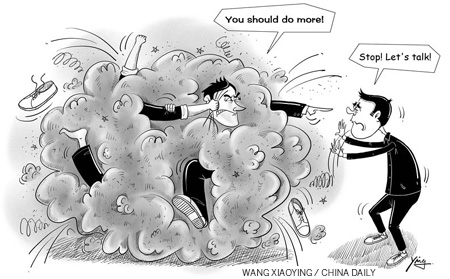Op-Ed Contributors
US key to peace on Korean Peninsula
Updated: 2010-12-03 07:58
By Sun Ru (China Daily)

Several countries have blamed China for the exchange of fire between the Democratic People's Republic of Korea (DPRK) and the Republic of Korea (ROK) last week. Many media outlets in the United States, Japan and the ROK have been particularly critical of Beijing.
But this is not the first time that they are making China the scapegoat. They tried to blame China when the DPRK conducted the second nuclear test in May and even for the Cheonan incident in March. It's easy for them to pass the buck by urging China to exert pressure on the DPRK to reach a compromise. They think that only by criticizing the DPRK and influencing its decisions can China play the role of a responsible power. But what they have forgotten in the process is that they too should make efforts to ease tension on the Korean Peninsula.
As a friendly neighbor of the DPRK, China has been helping it to develop its economy and raise the living standards of its people. It is true, too, that the two neighbors have relatively close economic and political relations.
China does have a certain amount of influence on the DPRK. But that does not mean that it can turn it into pressure. Contrary to some countries' allegations, China has been using this influence to maintain peace since the second nuclear crisis broke out on the peninsula. Beijing, however, wants all countries involved in the Six-Party Talks to take up equal responsibilities to diffuse the tension on the peninsula.
China has continued playing its constructive role after the exchange of fire by communicating and coordinating with various sides. Its State Councilor Dai Bingguo has already visited the ROK to persuade it to help start a six-party emergency meeting. But the US, guided by the policy of "strategic patience", is not in favor of resuming the talks. Instead, it believes in imposing more sanctions on the DPRK.
It is clear that China's approach to the Korean Peninsula issue is different from that of the US and the ROK. Condemning the DPRK can satisfy some countries, but it will not change Pyongyang's decisions. When it comes to its government's survival and state security, the DPRK will do whatever it deems fit to be done. No amount of external pressure is likely to change that.
For instance, despite China's strong opposition, the DPRK conducted a long-range missile test in July 2006. Thee months later it even carried out its first nuclear test. The world has to understand that the DPRK makes its security decisions independently.
The key to permanent peace on the peninsula actually lies with the US, even though other countries have a role to play. It is the US that made the DPRK feel insecure by offering nuclear protection to the ROK, stationing troops there and holding frequent military drills close to the DPRK's borders. Among the six parties involved in the talks, only China and Russia have diplomatic relations with the ROK and the DPRK both. Neither the US nor Japan has diplomatic ties with the DPRK, deepening its sense of insecurity.
The DPRK wants to improve relations with the US and hold direct talks with it. It pulled out of Six-Party Talks because it wanted to hold direct talks with the US instead of being sandwiched between other countries. Perhaps that is the only way the DPRK could have attracted the US' attention and made the US agree to hold direct talks.
But recently, the DPRK has been saying that it wants the Six-Party Talks to resume, and may have used news of its nuclear enrichment facilities to attract US attention. Hence, it is up to the US to improve relations with the DPRK and restore peace on the peninsula.
In a special report, Siegfried Hecker, the US nuclear scientist who visited the DPRK recently, said the US holds the key to solving the Korean Peninsula nuclear problem, because Pyongyang will slow down its nuclear weapons program only after it is confident of improved relations with Washington. Hecker said the only hope of coping with the nuclear issue lies in contacts, not military attacks or economic sanctions.
Former US president Jimmy Carter and former US ambassador to the ROK Donald Gregg, too, have said that Washington should resume talks with Pyongyang. If the Barack Obama administration does not come forward even after this, it will be avoiding its responsibilities.
Before blaming China for all the crises, other countries should also consider Chinese people's sentiments toward the DPRK. According to a survey conducted after last week's exchange of fire, many Chinese people sympathized with the DPRK and did not believe that it posed a threat to the US or its allies.
It will need the joint efforts of all the countries involved in the Six-Party Talks to ease the tension on the Korean Peninsula but the responsibility of the US is greater.
During a recent telephone conversation with Dai Bingguo, US Secretary of State Hillary Clinton said Beijing and Washington share interests on the peninsula, and cooperation is essential. It's time the US turned its words into action.
The author is a research scholar with the China Institutes of Contemporary International Relations.
(China Daily 12/03/2010 page9)
E-paper

Ear We Go
China and the world set to embrace the merciful, peaceful year of rabbit
Preview of the coming issue
Carrefour finds the going tough in China
Maid to Order
Specials

Mysteries written in blood
Historical records and Caucasian features of locals suggest link with Roman Empire.

Winning Charm
Coastal Yantai banks on little things that matter to grow

New rules to hit property market
The State Council launched a new round of measures to rein in property prices.
